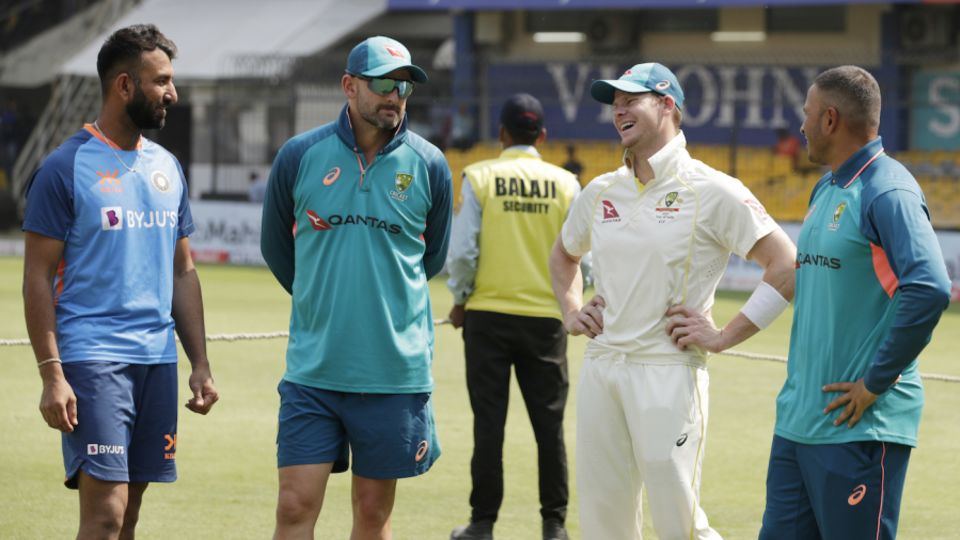Australia’s bid for a
series-levelling victory in Ahmedabad, which would go down as one of their finest results, could begin in front of a world record Test match crowd amid further intrigue over what the pitch will offer with India seeking to bounce back from a rare home defeat.
The opening day of the final Test will see a brief but elaborate attendance by the Prime Ministers of both countries with Narendra Modi, who the stadium is named after, hosting his Australian counterpart Anthony Albanese.
Quite what the crowd ends up being around the first ball remains to be seen, but if it’s above the 91,112 which attended the first day of the
2013-14 Ashes Boxing Day Test at the MCG then Melbourne will lose its crown. However, the authenticity of the record could be up for debate given reports have indicated up to 85,000 families and students will be bussed to the stadium.
Parking the politics, there are some practicalities to consider should a huge and loud crowd eventuate when play gets underway. Perhaps most significantly will be judging reviews that are based around edges but also communicating with team-mates over other line calls.

Rahul Dravid: Need to be realistic about batting in these challenging conditions

Has any visiting bowler bettered Nathan Lyon’s two eight-fors in India?

Cummins will miss final Test too, Smith to lead Australia in Ahmedabad

Murphy relishes ‘awesome’ battle with Kohli and ‘surreal’ start to Test cricket

Murphy and Kuhnemann keep pace with fast-forward Test cricket
“The talk has been excitement around actually playing a Test in front of that [size crowd] then actually just the logistics of it on the field – how you deal with reviews, all that sort of stuff, because the noise will play a huge part in that,”
Daniel Vettori, Australia’s assistant coach, said earlier in the week. “Guys will be trying to be as pragmatic as possible around how it’s actually going to play out.”
It’s uncertain what size crowd will attend on the other days – however long the game lasts – or indeed how many will remain in the stadium once the early formalities are complete. Both leaders are only expected to stay for around an hour of the first session.
Attendances have been encouraging during the series. But whether fans will get to see a fourth day for the first time was hard to judge two days out with what appeared a bit of further byplay going on around the pitches.
Two surfaces were covered and uncovered at regular intervals, as both were being considered for use, but just before Australia left a few of the squad did gather around the drier-looking of the two pitches.
Then when India began their training session there looked to be confirmation that it was the chosen pitch with
Rahul Dravid and
Rohit Sharma taking turns to ask for the cover to be pulled back. That was further reinforced when the television cameras were being put into place later on Tuesday afternoon.
The greener of the two surfaces may have come into play had India won in Indore. Before the game Rohit had raised the prospect of
a more seamer-friendly pitch to aid preparations for the World Test Championship final. As it stands now, however, India still have to guarantee their berth against Australia, although the result in Christchurch, where New Zealand face Sri Lanka, may yet make the outcome in Ahmedabad irrelevant in that regard.
India were effectively beaten at their own game
in Indore on a pitch that was
rated “poor” by the ICC. The venues themselves have no control over the surfaces with BCCI centralising the process but it’s unlikely the board would want to suffer back-to-back sanctions even if they plan to appeal the Holkar Stadium judgment.
The two Tests played at the Ahmedabad ground since its development were against England in 2021. The first, a
day-night contest, ended inside two days with Axar Patel taking 11 wickets and Joe Root 5 for 8.
The second only went a little longer with spin again dominating, although batters were able to succeed with Rishabh Pant making a century and Washington Sundar 96.
Pitch debate has dominated this series from the moment images emerged before the first match in Nagpur of the
selective watering. After the Indore defeat, Rohit
was unapologetic about the nature of the pitches, saying it was what India wanted and they accepted that it could go against them when conditions were extreme.
“Honestly the pitch talk is getting too much, every time we play in India focus is only on the pitch. We focus too much on the pitch in India,” he said. “I don’t think that is necessary. Honestly speaking, these are the kind of pitches we want to play on. This is our strength, so when you’re playing at your home, you always play to your strength, not worry about what people outside are talking about.”
One of the key reasons Australia were able to fight back in Indore was because they have not taken a negative view to it, rather embraced the challenge to finding solutions.
“Personally I really enjoy playing on these kind of wickets,”
Steven Smith said after Indore. “I prefer this than just a genuine flat wicket that goes five days and can be boring in stages. There’s always something happening on these wickets. You’ve got to really work hard for your runs. But it’s showed that the guys can do it. You’ve got to work hard for them and you need some luck.”
If Australia can channel their positive outlook one more time, it could secure a drawn series against the odds, and against the conditions.












